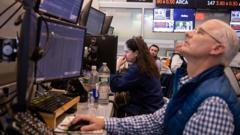In a major turn of events, US stocks witnessed a remarkable surge following President Donald Trump’s announcement to suspend certain tariffs as negotiations with trade partners continue.
US Stock Market Soars Post Tariff Suspension Decisions

US Stock Market Soars Post Tariff Suspension Decisions
US economy reacts positively after White House delays some tariffs amid ongoing negotiations.
Empty line
The stock market experienced a significant upswing when President Trump revealed his decision to put on hold the increase in tariffs on a broad array of goods from various countries, instead opting for a 10% import tax. The White House clarified that the suspension of the steeper levies was directed towards trade partners agreeing to engage in talks. In contrast, Trump signaled an increase in tariffs on products originating from China, raising them to a staggering 125%, effective immediately.
The market reacted favorably, with the S&P 500 soaring by 7% in afternoon trading, paving the way for its most profitable day in several years. This optimism comes on the heels of recent market instability, driven by fears of an impending economic downturn linked to ongoing trade tensions. Major indices reflected this market buoyancy; the Dow gained over 6.7%, while the Nasdaq experienced a boost of more than 10%.
Economic experts commented on the situation, noting that Trump's ability to stabilize the stock market amidst previous sell-offs was crucial. Paul Ashworth, chief North America economist at Capital Economics, suggested that while Trump might resort to a universal 10% tariff proposal that surfaced during his campaign, negotiations between the US and China could remain complex and protracted, with no immediate resolution likely in the near future.
As the trade dynamics continue to unfold, market actors remain cautiously optimistic, anticipating eventual discussions that could lead to a more stable economic outlook.
The stock market experienced a significant upswing when President Trump revealed his decision to put on hold the increase in tariffs on a broad array of goods from various countries, instead opting for a 10% import tax. The White House clarified that the suspension of the steeper levies was directed towards trade partners agreeing to engage in talks. In contrast, Trump signaled an increase in tariffs on products originating from China, raising them to a staggering 125%, effective immediately.
The market reacted favorably, with the S&P 500 soaring by 7% in afternoon trading, paving the way for its most profitable day in several years. This optimism comes on the heels of recent market instability, driven by fears of an impending economic downturn linked to ongoing trade tensions. Major indices reflected this market buoyancy; the Dow gained over 6.7%, while the Nasdaq experienced a boost of more than 10%.
Economic experts commented on the situation, noting that Trump's ability to stabilize the stock market amidst previous sell-offs was crucial. Paul Ashworth, chief North America economist at Capital Economics, suggested that while Trump might resort to a universal 10% tariff proposal that surfaced during his campaign, negotiations between the US and China could remain complex and protracted, with no immediate resolution likely in the near future.
As the trade dynamics continue to unfold, market actors remain cautiously optimistic, anticipating eventual discussions that could lead to a more stable economic outlook.






















